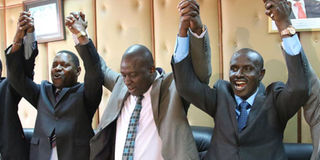NHIF levies spark port workers’ strike

Trade Unions Congress of Kenya (TUC-Ke) leaders secretary general Wilson Sossion (right), national chairman Tom Odege (centre) TUC-Ke deputy Secretary General Charles Mukhwaya (left) sing solidarity song at their offices in Nairobi on July 01, 2015 where they announced a country wide general strike on the new NHIF rates. PHOTO | JEFF ANGOTE | NATION MEDIA GROUP
What you need to know:
- About 500 containers are off-loaded from ships daily, meaning that many importers and exporters were inconvenienced by yesterday’s strike, which came four days after another on Saturday.
- The head of human resources, Mr Salim Chingabwe, could not be reached as calls to his mobile phone went unanswered. Our source said senior managers were held up in meetings all day seeking a resolution to the impasse.
- Speaking by phone from Nairobi, Mr Sang said TUCK, which has about 80,000 members, had agreed with the NHIF board of directors that the new levies would be suspended until a consensus had been reached.
Operations at the Port of Mombasa — East Africa’s busiest — were paralysed yesterday when all the 6,000 members of the Dock Workers Union downed their tools.
At the Likoni Ferry, where over 200 workers joined the strike, managers had to work the toll points at which drivers pay for vehicles to be ferried across the channel. Fortunately for the ferry users, the coxswains did not join the strike.
Kenya Ports Authority workers went on strike to protest the new National Hospital Insurance Fund levies that they said had been gazetted without their approval.
Journalists were denied entry into the port but sources there said all operations were grounded.
“Nothing has been happening. There is no handling of cargo at the container terminal,” said the source, who could not be named for fear of reprisals.
Trucks pick up an average of 1,500 containers daily from the port. About 500 containers are off-loaded from ships daily, meaning that many importers and exporters were inconvenienced by yesterday’s strike, which came four days after another on Saturday. In the earlier strike, the workers were protesting the introduction of a biometric system they claimed was faulty.
Yesterday, hundreds of idle trucks waiting to enter the port clogged roads in Changamwe and Mikindani, sparking complaints from drivers.
Mr William Kidima, the business representative for Uganda at the port, said it was not easy to quantify the losses.
“If it goes for two days we may have to ask (the) KPA to waive charges for us because it is not our fault that cargo remains at the port while it’s supposed to be cleared,” he said.
KPA Managing Director Gichiri Ndua is on an official trip abroad. The head of human resources, Mr Salim Chingabwe, could not be reached as calls to his mobile phone went unanswered. Our source said senior managers were held up in meetings all day seeking a resolution to the impasse.
At the Likoni channel, managers manned the toll points where vehicles pay crossing fees. They also directed vehicles in and out of the ferries. Some were unsure how to direct the traffic, leading some motorists to drive the wrong way, causing confusion. Over 5,000 vehicles and 300,000 commuters cross the channel daily.
Dock Workers Union Secretary-General Simon Sang said workers allied to the Trade Union Congress in Kenya (TUCK) would join the strike in other parts of the country today.
Speaking by phone from Nairobi, Mr Sang said TUCK, which has about 80,000 members, had agreed with the NHIF board of directors that the new levies would be suspended until a consensus had been reached.
“We negotiated with NHIF managers that salaries should be charged based on the basic salary and not on gross pay. We further agreed that we would finalise the matter in a week’s time. But we were surprised when the charges were gazetted in less than a week behind our back,” he said.
Reported by Daniel Nyassy, Mohamed Ahmed and Gitonga Marete




